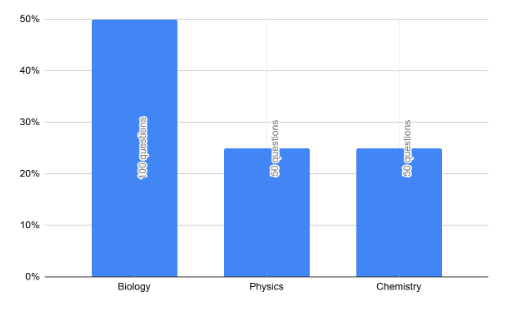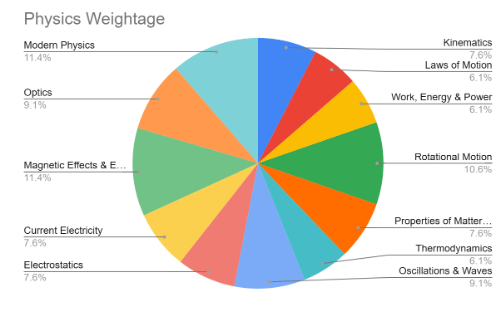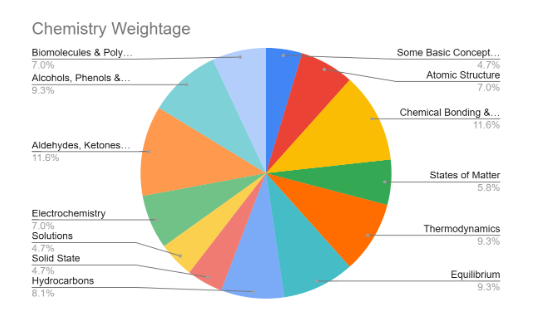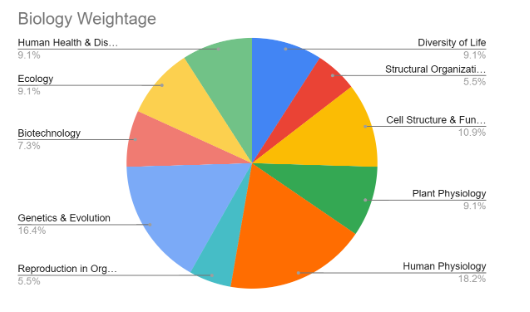The NEET 2025 is set to occur in the first week of May 2025 where more than 20 lakh students are supposed to appear for this exam to compete for the topmost medical colleges of India.
The exam has 200 questions covering Physics, Chemistry, and Biology, with a total of 720 marks. To prepare well, it’s important to know which chapters carry more weight. Usually, 50-55% of the questions are based on Class 12 topics, and the remaining come from Class 11.
- Physics: 50 questions, 180 marks. The major areas are Mechanics (40%), Electrodynamics (20%), and Modern Physics (10%). These are the areas that one needs to be strong in to get good marks.
- Chemistry: 50 questions, 180 marks. The major areas are Chemical Bonding (12%) and Thermodynamics (15%). The rest of the preparation should be balanced between Physical, Organic, and Inorganic Chemistry.
- Biology: The major section, comprises 100 questions and 360 marks, with over-emphasis in Genetics (18%), Human Physiology (15%), and Ecology (12%), respectively, making those subjects important and vital for better scores.
NEET has made sure that the distribution of questions in Classes 11 and 12 is balanced. In 2024, Mechanics (40%) was important in Physics, Thermodynamics (15%) dominated Chemistry, and Genetics (18%) dominated Biology.
“For NEET 2025, speculations of syllabus change are there, but no official updates have been announced. Candidates should stick to the full NCERT syllabus for effective preparation.”
Check, the latest updates:
NEET 2025 Exam Overview
The NEET 2025 exam is the entrance for students who wish to take undergraduate medical courses in India. It is conducted by the National Testing Agency (NTA) and tests candidates in Physics, Chemistry, and Biology.
| Aspect | Details |
|---|---|
| Exam Date | First week of May 2025 |
| Total Questions | 200 questions (Physics, Chemistry, Biology) |
| Total Marks | 720 marks |
| Duration | 3 hours |
| Subjects | Physics, Chemistry, Biology |
| Mode of Exam | Pen and Paper (Offline) |
| Marking Scheme | (+4) for correct answers,(-1) for wrong answers |
| Eligibility | 12th pass or equivalent with PCB (Physics, Chemistry, Biology) |
| Expected Candidates | 20+ lakh candidates |
NEET 2025: Subject-Wise Weightage
Understanding the weightage distribution across the three core subjects of NEET 2025 is essential for prioritizing your study plan. Here's a detailed breakdown that highlights the significance of each subject in terms of total questions and marks, helping you focus on high-yield areas:
| Subject | Total Questions | Marks | Percentage of Total Marks | Key Focus Areas |
|---|---|---|---|---|
| Biology | 100 questions | 360 marks | 50% | Genetics, Human Physiology, Ecology |
| Physics | 50 questions | 180 marks | 25% | Mechanics, Electrodynamics, Modern Physics |
| Chemistry | 50questions | 180 marks | 25% | Chemical Bonding, Thermodynamics, Organic Chemistry |

How Many Chapters Are There in NEET 2025 Subject-Wise?
The number of chapters in NEET 2025 is divided among three subjects, Physics, Chemistry, and Biology. Several chapters set for each of the subjects have been taken based on the NCERT Syllabus as follows:
| Subject | Class 11 Chapters | Class 12 Chapters | Total Chapters |
|---|---|---|---|
| Physics | 14 | 15 | 29 |
| Chemistry | 13 | 17 | 30 |
| Biology | 15 | 23 | 38 |
NEET 2025: Chapter-Wise Weightage breakdown
Understanding the chapter-wise weightage for NEET 2025 would help in forming a targeted study plan. Breakdown of the weightage by subject and the specific chapters that have key topics within them will assist students in the high-yield area focus.
All the chapters for Physics, Chemistry, and Biology are given in detail below, showing the total weight each chapter carries.
Physics Chapter-Wise Weightage Breakdown
Physics in NEET 2025 emphasizes conceptual understanding and numerical application, with topics like Mechanics, Electrodynamics, and Modern Physics carrying significant weight.
| Class | Chapters | Weightage | Avg. Questions | Key Topics |
|---|---|---|---|---|
| Class 11 | Kinematics | 10% | 2-3 | Equations of Motion, Projectile Motion |
| Laws of Motion | 8% | 1-2 | Newton’s Laws, Free-Body Diagrams | |
| Work, Energy & Power | 8% | 1-2 | Work-Energy Theorem, Power | |
| Rotational Motion | 14% | 3-4 | Moment of Inertia, Torque | |
| Properties of Matter & Fluids | 10% | 2-3 | Viscosity, Bernoulli’s Principle | |
| Thermodynamics | 8% | 1-2 | Laws of Thermodynamics, Carnot Cycle | |
| Oscillations & Waves | 12% | 2-3 | Simple Harmonic Motion, Sound Waves | |
| Class 12 | Electrostatics | 10% | 2-3 | Electric Field, Potential, Capacitance |
| Current Electricity | 10% | 2-3 | Ohm’s Law, Circuit Analysis | |
| Magnetic Effects & Electromagnetic Induction | 15% | 4-5 | Faraday’s Law, Magnetic Fields | |
| Optics | 12% | 3-4 | Reflection, Refraction, Interference | |
| Modern Physics | 15% | 4-5 | Photoelectric Effect, Atomic Models |

Also, Check: NEET 2025 Physics Syllabus
What is the Weightage of NEET Physics 2025?
The weightage of Physics in NEET 2025 is significant, comprising 45 questions for 180 marks. The major topics contributing to this include Mechanics (about 40%), Electrodynamics (around 20%), and Modern Physics (approximately 10%). A strong focus on these core areas is crucial for scoring well in the Physics section of the exam.
Chemistry Chapter-Wise Weightage Breakdown
Chemistry offers a balanced mix of Physical, Organic, and Inorganic topics, with high-scoring chapters like Chemical Bonding, Thermodynamics, and Coordination Compounds.
| Class | Chapters | Weightage | Avg. Questions | Key Topics |
|---|---|---|---|---|
| Class 11 | Some Basic Concepts of Chemistry | 4% | 1 | Mole Concept, Stoichiometry |
| Atomic Structure | 6% | 1-2 | Quantum Numbers, Electron Configuration | |
| Chemical Bonding & Molecular Structure | 10% | 2-3 | VSEPR Theory, Hybridization | |
| States of Matter | 5% | 1 | Gas Laws, Van der Waals Equation | |
| Thermodynamics | 8% | 2 | Enthalpy, Entropy, Gibbs Energy | |
| Equilibrium | 8% | 2 | Le Chatelier’s Principle, pH | |
| Hydrocarbons | 7% | 1-2 | Alkanes, Alkenes, Aromatics | |
| Class 12 | Solid State | 4% | 1 | Unit Cell, Packing Efficiency |
| Solutions | 4% | 1 | Colligative Properties | |
| Electrochemistry | 6% | 1-2 | Nernst Equation, Batteries | |
| Aldehydes, Ketones & Carboxylic Acids | 10% | 2-3 | Nucleophilic Addition Reactions | |
| Alcohols, Phenols & Ethers | 8% | 2 | Electrophilic Substitution | |
| Biomolecules & Polymers | 6% | 1-2 | DNA, Proteins, Monomers |

Also, Check: NEET 2025 Chemistry Syllabus
Biology Chapter-Wise Weightage Breakdown
Biology, the most crucial section in NEET, demands a detailed understanding of Genetics, Human Physiology, and Ecology, which form a major part of the syllabus.
| Class | Chapters | Weightage | Avg. Questions | Key Topics |
|---|---|---|---|---|
| Class 11 | Diversity of Life | 10% | 3-4 | Taxonomy, Five Kingdom Classification |
| Structural Organization in Animals | 6% | 2 | Animal Tissues, Cockroach Anatomy | |
| Cell Structure & Function | 12% | 3-4 | Cell Organelles, Cell Cycle | |
| Plant Physiology | 10% | 3-4 | Photosynthesis, Plant Hormones | |
| Human Physiology | 20% | 7-8 | Digestive, Circulatory, Nervous Systems | |
| Class 12 | Reproduction in Organisms | 6% | 2 | Sexual and Asexual Reproduction |
| Genetics & Evolution | 18% | 6-7 | Mendelian Genetics, Evolution Theories | |
| Biotechnology | 8% | 2-3 | Genetic Engineering, Applications | |
| Ecology | 10% | 3-4 | Ecosystem, Biodiversity Conservation | |
| Human Health & Diseases | 10% | 3-4 | Immunity, Human Diseas |

Also, Check: NEET 2025 Biology syllabus
Most Expected Topics in NEET 2025
To perform well in NEET 2025, it is essential to focus on the high-weightage topics across all three subjects—Physics, Chemistry, and Biology. These topics are frequently tested and require deep conceptual clarity for effective preparation. Below is a breakdown of the most important topics for each subject:
Physics: Important Topics for NEET 2025
In NEET 2025, physics requires a strong grasp of theoretical ideas as well as the ability to solve problems, especially when it comes to subjects like mechanics, electrodynamics, and modern physics.
| Topic | Why It’s Important |
|---|---|
| Mechanics | Forms a major part of Physics with topics like Laws of Motion and Work, Energy & Power. |
| Electrodynamics | Includes essential concepts like Electrostatics, Current Electricity, and Magnetism. |
| Modern Physics | Key concepts like Atomic Structure and Nuclear Physics often contribute to a significant number of questions. |
| Thermodynamics | Fundamental topic with concepts like Laws of Thermodynamics and Heat Engines. |
| Optics | Vital for understanding Reflection, Refraction, and Wave Optics, frequently featured in exams. |
Chemistry: Important Topics for NEET 2025
In NEET 2025, chemistry is evenly distributed throughout the Physical, Organic, and Inorganic sections. The main focus areas include crucial subjects like Chemical Bonding, Thermodynamics, and Organic Chemistry.
| Topic | Why It’s Important |
|---|---|
| Chemical Bonding | Central to understanding the structure of molecules and compounds. Essential for both Inorganic and Organic Chemistry. |
| Thermodynamics | Forms the foundation for physical chemistry and deals with the laws governing energy changes. |
| Equilibrium | Crucial for understanding dynamic equilibrium, acids, bases, and ionic equilibrium. |
| Organic Chemistry | Covers topics like Hydrocarbons, Aldehydes, and Ketones that form a significant part of NEET Chemistry. |
| Coordination Compounds | A high-weightage topic in Inorganic Chemistry, often tested in both theoretical and practical sections. |
Biology: Important Topics for NEET 2025
The largest portion of NEET 2025, biology, demands extensive preparation in subjects like ecology, genetics, and human physiology to receive a competitive score.
| Topic | Why It’s Important |
|---|---|
| Human Physiology | Covers major systems like the circulatory, digestive, and nervous systems, contributing significantly to Biology marks. |
| Genetics & Evolution | High-yield topic with questions on Mendelian Genetics, Genetic Disorders, and Evolutionary Theories. |
| Ecology & Environment | Consistently important for understanding ecosystems, biodiversity, and conservation, contributing a significant number of questions. |
| Reproduction | Key for both plants and animals, frequently tested in terms of reproductive systems and reproductive health. |
| Cell Biology | Fundamental to understanding the basic unit of life and its processes, often contributing to conceptual questions. |
Preparation Tips to Crack NEET 2025 with Top Scores
Preparing for NEET 2025 requires a focused, well-organized study plan combined with the right strategies. With the increasing competition and evolving syllabus, students need to stay updated and use proven methods to maximize their preparation efforts. Here are some effective strategies to guide your NEET 2025 journey:
Effective Tips for NEET 2025 Preparation:
- Understand the syllabus in detail: Start by understanding the entire NEET 2025 syllabus, focusing on important chapters in Physics, Chemistry, and Biology based on the previous year's weightage and trends.
- Create a study plan: Design a schedule that allocates enough time for all subjects. Balance your time between theory, practice, and revision to avoid burnout.
- Prioritize heavy topics: Focus on heavy topics such as mechanics, chemical bonds, genetics, and human physiology. These subjects are often tested and have higher scores.
- Strengthen your NCERT Foundation: NEET is heavily dependent on the NCERT syllabus, so make sure you fully understand and master the NCERT books for all subjects. especially biology
- Solve Previous Year Exams: Solve previous year NEET exams regularly to get familiar with the exam pattern, question types, and time management.
- Practice mock exams regularly: Take online mock exams to simulate the real exam environment. This will help you improve your speed and accuracy and build confidence in the test.
How to Score 700+ in NEET 2025: 2 Months Preparation Plan
Achieving a score of 700+ in NEET 2025 is possible with a strategic and focused approach. During this time, revision, problem-solving, and time management become crucial for maximizing performance.
60 Days Preparation Plan
| Timeframe | Focus Areas | Details |
|---|---|---|
| Day 1-10 | Foundation Revision | Revise key Class 11 topics like Mechanics, Chemical Bonding, and Human Physiology. |
| Day 11-20 | High-Weightage Topics | Focus on Class 12 topics like Modern Physics, Organic Chemistry, Genetics, and Ecology. |
| Day 21-30 | Subject-Specific Practice | Solve topic-specific questions in Physics, Chemistry, and Biology. Analyze mistakes regularly. |
| Day 31-40 | Mixed Question Practice | Attempt mixed mock tests covering multiple chapters from all three subjects. Work on weak areas. |
| Day 41-50 | Full-Length Mock Tests | Practice 5-6 full-length tests to improve speed and accuracy. Analyze your performance thoroughly. |
| Day 51-55 | Targeted Revision | Revise formulas, diagrams, and important concepts from NCERT for all subjects. |
| Day 56-59 | Final Mock Tests | Take 2-3 final full-length mock tests under timed conditions. Focus on minimizing mistakes. |
| Day 60 | Rest and Preparation Checklist | Relax, revise key points, and mentally prepare for the exam day. |
Check NEET Previous Year Cutoff (2024 - 2023)
| College | 2024 | 2023 |
|---|---|---|
47 | 57 | |
141 | 1556 | |
151 | 1012 | |
374 | 534 | |
510 | 621 | |
655 | 603 | |
676 | 2353 | |
731 | 931 | |
778 | 635 | |
826 | 5081 | |
953 | 1264 | |
1010 | 1962 | |
1031 | 485684 | |
1098 | 1084 | |
1098 | 1084 |
*The article might have information for the previous academic years, which will be updated soon subject to the notification issued by the University/College.



.png?h=35&w=35&mode=stretch)



Comments
Found 2 Comments
For Biology, Human Physiology, Diversity in Living Organisms, and Genetics & Evolution are some imporatnt topics. While from Chemistry, Hydrocarbons and Thermodynamics are the must and from Physics Ray Optics and Current Electricity have the highest weightage.